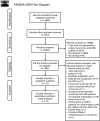Efficacy and Safety of Antidepressants for the Treatment of Irritable Bowel Syndrome: A Meta-Analysis
- PMID: 26252008
- PMCID: PMC4529302
- DOI: 10.1371/journal.pone.0127815
Efficacy and Safety of Antidepressants for the Treatment of Irritable Bowel Syndrome: A Meta-Analysis
Abstract
Aim: The aim of this meta-analysis was to analyze the efficacy and safety of antidepressants for the treatment of irritable bowel syndrome.
Methods: We searched MEDLINE, EMBASE, Scopus and The Cochrane Library for randomized controlled trials investigating the efficacy and safety of antidepressants in the treatment of irritable bowel syndrome. Article quality was evaluated by Jadad score. RevMan 5.0 and Stata 12.0 were used for the meta-analysis.
Results: Twelve randomized controlled trials were included in this study and most of these trials were of high quality (Jadad score ≥4). Five articles focused on tricyclic antidepressants, six articles involved selective serotonin reuptake inhibitors, and one article investigated both types of treatment. The pooled risk ratio showed antidepressant treatment can improve global symptoms (RR = 1.38, 95% CI 1.08, 1.77). In the subgroup analysis, treatment with tricyclic antidepressants showed an improvement in global symptoms (RR = 1.36, 95% CI 1.07, 1.71), while treatment with selective serotonin reuptake inhibitors showed no statistically significant difference in global symptoms compared with the control groups (RR = 1.38, 95% CI 0.83, 2.28). The pooled risk ratio of dropout due to side effects following antidepressant treatment was 1.71 with 95% CI (0.98, 2.99). The subgroup analysis showed the pooled risk ratio of dropout in the tricyclic antidepressants group was 1.92 with 95% CI (0.89, 4.17). In the selective serotonin reuptake inhibitors group, the pooled risk ratio of dropout was 1.5 with 95% CI (0.67, 3.37). Selective serotonin reuptake inhibitors showed no benefit in alleviating abdominal pain and improving quality of life. There was no difference in the incidence of common adverse events between treatment and control groups.
Conclusions: TCAs can improve global symptoms of irritable bowel syndrome, while there was no strong evidence to confirm the effectiveness of SSRIs for the treatment of IBS.
Conflict of interest statement
Figures









Similar articles
-
Efficacy of gut-brain neuromodulators in irritable bowel syndrome: an updated systematic review and meta-analysis.Lancet Gastroenterol Hepatol. 2025 Jun;10(6):537-549. doi: 10.1016/S2468-1253(25)00051-2. Epub 2025 Apr 18. Lancet Gastroenterol Hepatol. 2025. PMID: 40258375
-
Antidepressants for people with epilepsy and depression.Cochrane Database Syst Rev. 2021 Apr 16;4(4):CD010682. doi: 10.1002/14651858.CD010682.pub3. Cochrane Database Syst Rev. 2021. PMID: 33860531 Free PMC article.
-
Comparison of agomelatine and selective serotonin reuptake inhibitors/serotonin-norepinephrine reuptake inhibitors in major depressive disorder: A meta-analysis of head-to-head randomized clinical trials.Aust N Z J Psychiatry. 2014 Jul;48(7):663-71. doi: 10.1177/0004867414525837. Epub 2014 Mar 6. Aust N Z J Psychiatry. 2014. PMID: 24604920
-
Antidepressants plus benzodiazepines for adults with major depression.Cochrane Database Syst Rev. 2019 Jun 3;6(6):CD001026. doi: 10.1002/14651858.CD001026.pub2. Cochrane Database Syst Rev. 2019. PMID: 31158298 Free PMC article.
-
Efficacy of tricyclic antidepressants in irritable bowel syndrome: a meta-analysis.World J Gastroenterol. 2009 Apr 7;15(13):1548-53. doi: 10.3748/wjg.15.1548. World J Gastroenterol. 2009. PMID: 19340896 Free PMC article.
Cited by
-
Irritable Bowel Syndrome: News from an Old Disorder.GE Port J Gastroenterol. 2020 Jul;27(4):255-268. doi: 10.1159/000503757. Epub 2019 Nov 6. GE Port J Gastroenterol. 2020. PMID: 32775547 Free PMC article. Review.
-
Shortcomings of Trials Assessing Antidepressants in the Management of Irritable Bowel Syndrome: A Critical Review.J Clin Med. 2020 Sep 11;9(9):2933. doi: 10.3390/jcm9092933. J Clin Med. 2020. PMID: 32932856 Free PMC article. Review.
-
Irritable bowel syndrome: Epidemiology, overlap disorders, pathophysiology and treatment.World J Gastroenterol. 2023 Jul 14;29(26):4120-4135. doi: 10.3748/wjg.v29.i26.4120. World J Gastroenterol. 2023. PMID: 37475846 Free PMC article. Review.
-
Use of antidepressants and risks of restless legs syndrome in patients with irritable bowel syndrome: A population-based cohort study.PLoS One. 2019 Aug 1;14(8):e0220641. doi: 10.1371/journal.pone.0220641. eCollection 2019. PLoS One. 2019. PMID: 31369638 Free PMC article.
-
A Systematic Review on the Efficacy and Safety of Selective Serotonin Reuptake Inhibitors in Gastrointestinal Motility Disorders: More Control, Less Risk.Cureus. 2022 Aug 4;14(8):e27691. doi: 10.7759/cureus.27691. eCollection 2022 Aug. Cureus. 2022. PMID: 36081982 Free PMC article. Review.
References
-
- Deechakawan W, Heitkemper MM, Cain KC, Burr RL, Jarrett ME. Anxiety, depression, and catecholamine levels after self-management intervention in irritable bowel syndrome. Gastroenterology nursing: the official journal of the Society of Gastroenterology Nurses and Associates. 2014;37(1):24–32. 10.1097/SGA.0000000000000017 . - DOI - PubMed
-
- Pinto C, Lele MV, Joglekar AS, Panwar VS, Dhavale HS. Stressful life-events, anxiety, depression and coping in patients of irritable bowel syndrome. The Journal of the Association of Physicians of India. 2000;48(6):589–93. . - PubMed
-
- Locke GR III, Weaver AL, Melton LJ III, Talley NJ. Psychosocial factors are linked to functional gastrointestinal disorders: a population based nested case-control study. The American journal of gastroenterology. 2004;99(2):350–7. . - PubMed
-
- Ford AC, Quigley EM, Lacy BE, Lembo AJ, Saito YA, Schiller LR, et al. Effect of antidepressants and psychological therapies, including hypnotherapy, in irritable bowel syndrome: systematic review and meta-analysis. The American journal of gastroenterology. 2014;109(9):1350–65; quiz 66. 10.1038/ajg.2014.148 . - DOI - PubMed
Publication types
MeSH terms
Substances
LinkOut - more resources
Full Text Sources
Other Literature Sources
Medical

